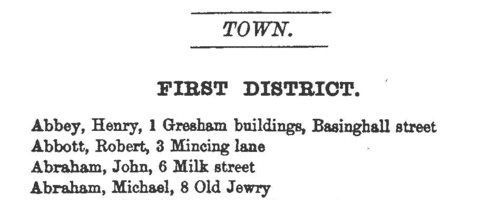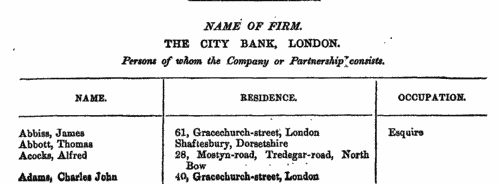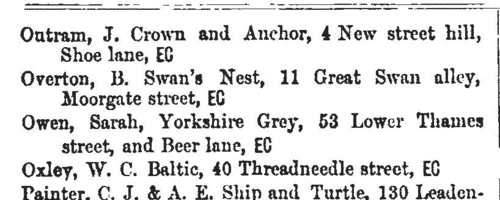Add this eBook to your basket to receive access to all 161 records. Our indexes include entries for the spelling wrigglesworth. In the period you have requested, we have the following 161 records (displaying 121 to 130): These sample scans are from the original record. You will get scans of the full pages or articles where the surname you searched for has been found. Your web browser may prevent the sample windows from opening; in this case please change your browser settings to allow pop-up windows from this site. Long-stay Paupers in Workhouses: Leeds Township (Yorkshire)
(1861)
This comprehensive return by the Poor Law Board for England and Wales in July 1861 revealed that of the 67,800 paupers aged 16 or over, exclusive of vagrants, then in the Board's workhouses, 14,216 (6,569 men, 7,647 women) had been inmates for a continuous period of five years and upwards. The return lists all these long-stay inmates from each of the 626 workhouses that had been existence for five years and more, giving full name; the amount of time that each had been in the workhouse (years and months); the reason assigned why the pauper in each case was unable to sustain himself or herself; and whether or not the pauper had been brought up in a district or workhouse school (very few had). The commonest reasons given for this long stay in the workhouse were: old age and infirm (3,331); infirm (2,565); idiot (1,565); weak mind (1,026); imbecile (997); and illness (493). | Sample scan, click to enlarge

| Stockton-on-Tees Voters: Stockton Polling District
(1868)
This poll book for the First Parliamentary Election for the Borough of Stockton-on-Tees lists the voters alphabetically by polling district, with full name (surname first) and address. In the right-hand column D represents the Liberal candidate, Joseph Dodds, Esq., and V the Conservative, Lord Ernest Vane Tempest. The three polling districts were Norton, Stockton (including so much of Linthorpe as lay within the parliamentary borough of Stockton), and Thurnaby. At the end of each district the handful of lodger voters are listed separately. | Sample scan, click to enlarge

| London Members of the National Provident Institution
(1870)
The membership lists of the National Provident Institution were issued in separate volumes for Town (i. e., London and vicinity) and Country members. This list of Town Members is arranged alphabetically within fifteen districts (1 City; 2 Strand, Bloomsbury; 3 Pentonville, Islington, Highbury, Holloway; 4 Soho, St James's, Marylebone; 5 Camden Town, Kentish Town, Hampstead, Highgate; 6 Regent's Park, St John's Wood, Kilburn; 7 Paddington, Bayswater, Notting Hill, Acton, Ealing; 8 Brompton, Kensington, Hammersmith; 9 Westminster, Pimlico, Chelsea, Fulham; 10 Bishopsgate Without, Shoreditch, Finsbury, City Road, Hoxton; 11 Kingsland, De Beauvoir Town, Mildmay Park, Stoke Newington, Stamford Hill, Tottenham, Edmonton; 12 Whitechapel, Docks, Stepney, Limehouse, Poplar, Plaistow, Barking; 13 Spitalfields, Hackney Road, Bethnal Green, Mile End, Bow, Old Ford, Stratford; 14 Dalston, Hackney, Homerton, Clapton; 15 Southwark). Full name is given, surname first, and full postal address except in those few cases where the member subscribed through an agent. | Sample scan, click to enlarge

| City Bank Shareholders
(1873)
Copy of the return by the City Bank, London, to the Inland Revenue listing the 'persons of whom the Company or partnership consists', pursuant to 7 & 8 Vic. cap. 32: giving full name (surname first), residence and occupation (often not stated). | Sample scan, click to enlarge

| Innkeepers and Publicans in London south of the Thames
(1874)
Henry Downes Miles compiled this London and Suburban Licensed Victuallers', Hotel and Tavern Keepers' Directory, which also had sections listings brewers, maltsters, hop factors, distillers and rectifiers of the United Kingdom. | Sample scan, click to enlarge

| Bankrupts, Assignees, Trustees and Solicitors
(1880)
Bankruptcy notices in England and Wales, January to March 1880 | Sample scan, click to enlarge

| Debtors
(1880)
County Court Judgments in England and Wales | Sample scan, click to enlarge

| Missing Next-of-Kin and Heirs-at-Law
(1880)
The Unclaimed Money Registry and Next-of-Kin Advertisement Office of F. H. Dougal & Co., on the Strand in London, published a comprehensive 'Index to Advertisements for Next of Kin, Heirs at Law, Legatees, &c., &c., who have been Advertised for to Claim Money and Property in Great Britain and all Parts of the World; also Annuitants, Shareholders, Intestates, Testators, Missing Friends, Creditors or their Representatives, Claimants, Unclaimed and Reclaimed Dividends and Stock, Citations, Administrations, Rewards for Certificates, Wills, Advertisements, &c., Claims, Unclaimed Balances, Packages, Addresses, Parish Clerks' Notices, Foreign Intestates, &c., &c.' The original list was compiled about 1860, but from materials dating back even into the 18th century: most of the references belong to 1850 to 1880. For each entry only a name is given, sometimes with a placename added in brackets: there may be a reference number, but there is no key by which the original advertisement may be traced. The enquirer of the time had to remit £1 for a 'Full and Authentic Copy of the Original Advertisement, together with name and date of newspaper in which the same appeared'. | Sample scan, click to enlarge

| Debtors, Insolvents and Bankrupts
(1881)
Bills of sale (binding assets to a creditor/lender), insolvencies and bankruptcies in England and Wales, April to June 1881 | Sample scan, click to enlarge

| Debtors, Insolvents and Bankrupts
(1881)
Bills of sale (binding assets to a creditor/lender), insolvencies and bankruptcies in England and Wales, July to September 1881 | Sample scan, click to enlarge

|
Research your ancestry, family history, genealogy and one-name study by direct access to original records and archives indexed by surname.
|











